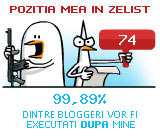Dintr-o carte fascinanta: When Culture Collides - Leading Across Cultures, Richard D. Lewis; Nicholas Brealey International, 1996, rev. 2006, pp. 324 - 329
Despre Romania, despre specificul sau cultural, despre cum sa te porti cu romanii, despre cum sa faci afaceri cu romanii, despre cum sa profiti de slabiciunile si de orgoliile lor pentru a merge treaba mai bine si / sau a nu calca in strachini.
Repet: o carte fascinanta, care trece in revista (mai ales depedeve organizational / al relatiilor de afaceri) multe din tarile lumii.
Highly recommended. De citit cap-coada, de doua ori, if possible.
* * *
CULTURE
Values
Romanian values are largely forged in the crucible of an invasion-prone territory— the Ottoman Turks, Czarist (and later Soviet) Russia and the Austro–Hungarian Empire. Opportunism and maverick behavior have enabled Romania to survive as a state, its territory expanding and contracting periodically, depending on the success of its alliances. Such historical conditions and exigencies have led to anomalous positions on foreign policy. The enduring concept of Romania Mare (Greater Romania) may be less notorious than Milosevic’s concept of Great Serbia, but it exists in Romanian minds nevertheless.
Such a kaleidoscopic, complex historical background has led to Romanian values such as:
• obsession to survive pride in being a Balkan anomaly
• opportunism social corruption
• apostasy nepotism
• volatility self-importance
• unpredictability sense of the ridiculous
• tendency to blame others black humor
• evasive techniques of action
CONCEPTS
Leadership and Status
Romania is situated in the part of Europe that was inhabited by peasant masses, ruled for centuries by sovereign lords, clan leaders and autocrats. In the post- Ceausescu period, modern leadership styles are hampered in their development, since the government is still run by former communist leaders, who function under other labels. Business leaders are also affected by the continuing influence of the political apparatus. Romanian managers are gradually developing a style of their own that resembles that of Italian managers: autocratic but paternalistic and using emotion as a manipulative tool.
Space and Time
Romanians, though not on the Mediterranean, have the Mediterranean sense of space; that is to say, they like rubbing shoulders with people and are comfortable in groups or crowded conditions. They stand closer than Slavs, who require occasional moments of solitude. Romanians are not punctual in general, especially with each other. Meetings usually start 30–45 minutes late. If you are invited to a Romanian home, it is best not to arrive early or on time, as the hosts will not be ready.
CULTURAL FACTORS IN COMMUNICATION
Communication Pattern
Romanians are oratorical by nature (neighbors say “long-winded”) and are proud of their sophistication in discourse. They rarely answer questions with yes or no, so it is not advisable to ask direct questions requiring affirmative or negative answers. It is better to hint at what you want and then be prepared to read between the lines of their reply. Their answers are in any case long and complex and may to some extent reflect what you want to hear. Their delicacy is Italian in nature, as is their capacity for flexible truth when questioned aggressively. Their style of address is personal, and they seek your own opinion or support rather than that of your organization.
Listening Habits
Romanians are attentive but suspicious listeners, who may interrupt you if anything you say seems contradictory. They are used to lengthy presentations and arguments, so if you are too brief you will not make much impact. 
Behavior at Meetings and Negotiations
Several decades of communism and repressive centralized rule have bequeathed Romania with a poor commercial infrastructure riddled with bureaucracy and corruption. The Westerner, consequently, must be wary of the possibility of being cheated—a common occurrence in a region with a hybrid Balkan and Turkish historical background.
Romanians are skilled diplomats and negotiators, and hard bargaining faces any foreigners who wish to do business with them. You will have to be careful to distinguish between apparent prospects and factual reality. Deals are rarely a straight transaction between two parties. Others are likely to be involved on a commission basis, exacting bribes or demanding “facilitation” payments. When you sense this is happening, bring in a Romanian go-between. Such “transaction costs” are generally laid at your door as the foreigner, unless you maintain
vigilance.
It is important to establish parameters at the outset of any business discussion, fixing procedures, limits and ultimate positions. Romanians will not be deterred from attempting to gain advantage, but once they have understood your position, they can behave in a constructive, creative and charming manner.
At meetings, extensive small talk is a necessary preamble. Be wary of painting yourself into a corner at this stage. When the Romanians get down to business, their statements must be taken with a pinch of salt. If you disagree with them, show this obliquely, as they hate being snubbed in any way. Never tell them what to do—it would upset their superiority complex. In general Romanians are risk takers (Turkish influence), and they will work hard to close a deal once everyone is on the same track. They are actually more open with foreigners than with each other, often showing reticence in front of their compatriots (a legacy of decades of spying, informing and eavesdropping). With foreigners they show their desire to please, but watch out for their frequent defense: “But that won’t work in Romania.”
When things get bogged down, Romanians often come out with spontaneous (and apparently new) ideas. Although they are skilled negotiators, they often show little knowledge of Western exigencies, particularly with regard to speed, urgency or integrity.
Follow-through is not a Romanian strong point. When a deal is concluded, everything should be put in writing, witnessed by decision makers and the competent experts. After that, it is advisable to get further approval (in writing) from a very senior person in the organization. Romanians are often comfortable with ambiguity, whereas the Westerner wants final clarity. The communist legacy has left them with a poor sense of accountability, responsibility and best routes to the bottom line.
There may be attempts to alter conditions or clauses after the agreement has been signed. Such steps must be resisted unequivocally.
Manners and Taboos
Given its incredible ethnic diversity, Romania has an impressive storehouse of manners, customs, traditions, folklore and folk art. Romanians have the reputation of being excessively or embarrassingly hospitable. One Romanian writer describes this as “aggressive hospitality.” You have to be, for example, very careful not to “under-indulge” at a meal in a Romanian home or to refuse anything being offered. The only defense against Romanian hospitality is to reciprocate their generosity. Items from your own country are often most appropriate. Wellillustrated books, prints, quality pens, attractive stationery, ties, scarves and packaged foods (delicatessen) are appreciated. Some Romanians like good whisky or cognac.
Taboos include impolite or brusque behavior; blunt, direct remarks showing disagreement; and inquisitiveness as to personal details.
How to Empathize with Romanians
Romanians get on well with people who are happy to converse at length, especially about poetry, philosophy, history and the arts. Qualities they admire are erudition, delicacy of expression, intuition and compassion. Exchanges can be on a close personal basis, especially when you have attained a certain familiarity. Though more circumspect than Italians, Romanians resemble them in their desire for spiritual closeness, confidences and exploration of human feelings. The development of such relationships will make subsequent business dealings much easier to carry out, and, moreover, will lessen the likelihood of your being cheated.
Always keep the Romanians’ animosity toward Hungarians in mind, but Romanians suffer from a national persecution complex as a result of centuries of mistreatment by foreign conquerors. Suspicion is a national habit.
Finally, remember that at heart they are epicureans and want to have a good time with you.
Gata, avem democrație!
Acum o zi





13 comentarii:
" Some Romanians like good whisky "
La cine s-o fi gândit ??? :-)
>> To: All Romanian Speaking Staff
Subject: Improper Language Usage
It has been brought to our attention by several officials visiting our
office in Romania that offensive language is commonly used by our
Romanian speaking staff. Such behavior, in addition to violating our
policy, is highly unprofessional and offensive to both visitors and
staff. All personnel will immediately adhere to the following rules:
1.. Words like futui, în pula mea, pula and other such expressions
will not be tolerated or used for emphasis or dramatic effect, no
matter how heated a discussion may become.
2.. You will not say si-a bagat pula when someone makes a mistake, or s-a cacat pe el if you see someone being reprehended, or baga-mi-as, when a major mistake has been made. All forms and derivations of the verb a se caca and a se fute are utterly inappropriate and unacceptable in our environment.
3.. No project manager, section head or administrator under any
circumstances will be referred to as pula de om, cacanaru' or boul.
4.. Lack of determination will not be referred to as pulalau nor will
persons who lack initiative be referred to as muiangiu.
5.. Unusual or creative ideas offered by management are not to be
referred to as porcarii.
6.. Do not say futu-ti mata if somebody is persistent; do not add pula
mea, if a colleague is going through a difficult situation.
Furthermore,
you must not say am pus-o (refer to item 2) nor o sa ne-o traga when a
matter becomes excessively complicated.
7.. When asking someone to leave you alone, you must not say du-te-n
pula nor should you ever substitute "May I help you?" with, ce pula mea
vrei?.
8.. Under no circumstances should you ever call your elderly industrial
partners bosorogi împutiti.
9.. Do not say ia mai mereti-n pula cu cacatu' asta when a relevant
project is presented to you, nor should you ever answer futu-te-n cur
when your assistance is required.
10.. You should never call partner representatives as boul dracului or
tâmpitu' ala.
11.. The sexual behavior of our staff is not to be discussed in terms
such as pizdulica buna, futaciosu' or homalau' lu' peste.
11.. Last but not least, after reading this note, please do not say ma
sterg la cur cu textul asta.
Just keep it clean and dispose of it properly.
Thank you.
Turambare ,
Te rog din suflet sa ma scuzi asa cum ii rog si pe cititorii tai sa ma scuze , dar nu m-am putut abtine..... parca prea ma durea amintirea bancului asta vechi dupa citirea articolului tau....
Sensei,
Adevarat, sunt martor ca postatorul cu nikul @Canadianul este un om civilizat care are insa nostalgii, cate odata.
Always keep in mind...the great Romanian Russian friendship.
Richarg, spell it with the capital "G" ! :))
Canadiene, chapeau !
Turambar, de doua ori chapeau :))
mno... uite'asa incep iar sa nu ma regasesc ca roman.
cred ca totusi este notabila si lipsa unor reactii tipice in situatii critice (dezvaluirea unor uimitoare reactii verticale).
@ Dragos Bora: :p
@ Canadianul: :) Comme on, mate. Stim si noi, multitudinea de intzeleptzi si de specialishti din capu meu, sa facem diferenta intre mirlanie si umor. No offence taken, mate. Good point. Good point... :thumbsup: :)
@ Theophyl: Da, maestre. Stiu ca e om de treaba. Mama lui de comentator :)
@ Foto+grafie: :) :bow:
@ Castleless: E nasol ca nu mai incep sa te regasesti ca roman. Revino-tzi, Zoe! Trezeshte-te, Ghitza! Stop depression Start expression.
:) :p
Da, omul v-a studiat bine.De aia scriu in engleza pe blog.
nu vad un motiv sa citesc toate ineptiile cretinilor vestici!
They are actually more open with foreigners than with each other, often showing reticence in front of their compatriots.
cind au scris insa asta inseamna ca te-au categorisit un prost usor manipulabil ceea ce se vede in starea tarii. aici nu-i pot contrazice deoarece atitudinea romanului fata de straini dar in special fata de vestici este servila.
they often show little knowledge of Western exigencies, particularly with regard to speed, urgency or integrity.
asta o pot spune romanilor care viseaza inca la caii verzi pe pereti si nu celor care-i cunosc bine pe cretinii hoti prosti si nesimtiti care sint vesticii.
la un moment dat chiar spun ca dialogurile cu romanii nu se pot baza pe intrebari simple care necesita raspunsuri de da/nu asa cum este la ei unde domina prostia si primitivismul.
nenorocirea este ca romanii s-au vesticizat asa ca specia aia de vestic bou a aparut si la noi.
altfel javrele vestice au tupeu atunci cind vorbesc despre nepotism cind la ei se vind joburile bune prin familie sau la prieteni daca respectivii nu au copii pt ca multe se mostenesc deci inclusiv serviciile bune. sint firme unde nu poti intra daca nu ai pe nimeni. apoi coruptia la ei este peste orice inchipuire a unui roman care si-a facut din vest modelul absolut. sper ca acesta criza pe care voi o veti plati sa va indoaie atit cit sa va iasa pe vecie din cap idiotenia cu vestul luminos care face si drege. doar un mic exemplu de coruptie vestica daca aceasta criza inca nu se vede :) : toate cladirile guvernamentale din berlin au costat dublul pretului pt care au fost contractate. nu se poate face nimic deoarece legea nu permite controlul unor astfel de contracte in care sint implicate firme private in proportie de peste 70%. coruptia este deci legalizata! tot in germnia s-a construit la un moment dat si un port de care nu avea nimeni nevoie! si tot asa pot continua ani de zile sa insir asemenea exemple. comic este ca in romania se discuta despre coruptie deoarece prin comparatie se poate spune ca nu aveti asa ceva.
Da, stiu, am mai auzit argumentul asta, in general in fix aceeasi combinatie: ce nemernici sint, sint tata coruptilor, si ce fraeri esteti ca vreti sa va dati dupa ei. Implicit, se intelege ca am facut o maaare, dar mare prostie atunci cind ne-am rupt de la tzitza si de la capatul erecto-preputzial al maicii Rusii, marele popor rus care dupa cum stim cu totii libertate ne-a adus. Era muuult mai bine daca ramineam cu modelul social al rusilor. Era ceva sublim, ideal, ideatic, plin de poezia sferelor sublime, ah Tarkovski ah Dostoievski ah Tolstoi si Nureev si ce oameni de stiinta au.
Mda. Itzi intzeleg supararea. Nemtzii sint niste nemernici. In plus, au si pierdut al doilea razboi mondial. Cit despre francezi, ce sa zicem: niste loaze. Iar englezii sint absolut insuportabili, aroganti si ticalosi. Americanii? Ciiih. O pacoste: niste criminali capitalisti evrei care vor sa cucereasca lumea cu Wall Street-ul si cu portavioanele si cu McDonalds-ul si cu Hollywoodul lor de rahat - ai vazut ce filme proaste fac, mai ales in comparatzie cu Tarkovski?
Deci ramine cum am stabilit: tot pe vremuri era mai bine.
:blink: :/
Trimiteți un comentariu